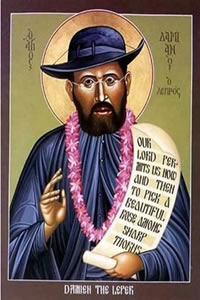Molokai
By Saint Damien of Molokai |
30 March, 2021
0 404
Father of mercy, in Saint Damien you have given us a shining witness of love for the poorest and most abandoned. Grant that, by his intercession, as faithful witnesses of the heart of your Son, Jesus, we too may be servants of the most needy and rejected. We ask this through our Lord Jesus Christ, your Son, Who lives and reigns with you and the Holy Spirit, One God, for ever and ever. Amen
-
View Saint Info
Celebrated: 10. May

Birth:
Death:
Outcasts, People with leprosy
Father Damien was a Roman Catholic priest from Belgium, who came to Honolulu in 1864. While Father Damien was serving in several parishes on the island of O’ahu, the native Hawaiians became afflicted by diseases introduced to their islands by foreign traders and sailors. Thousands died of influenza, syphilis and other ailments which had never before affected them. This included the plight of leprosy. At the time, leprosy was thought to be highly contagious and was thought to be incurable. In 1865, fearful of its spread, the Hawaiʻi Legislature passed and King Kamehameha V approved, the "Act to Prevent the Spread of Leprosy" which quarantined the lepers and moved them to settlement colonies known as Kalaupapa and Kalawao on the Peninsula of Molokaʻi. These were divided from the rest of the island by a steep mountain ridge, and even today the only land access is by a mule track. Damien's first course of action was to build a church and establish the Parish of Saint Philomena. His role was not limited to being a priest: he dressed ulcers, built homes and beds, built coffins and dug graves. Damien's arrival is seen by some as a turning point for the community. Under his leadership, basic laws were enforced, shacks became painted houses, working farms were organized and schools were erected. At his own request, and that of the lepers, Father Damien remained on Molokaʻi. After sixteen years of caring for the physical, spiritual, and emotional needs of those in the leper colony, he eventually contracted and died of the disease, and is widely considered a "martyr of charity". He is the ninth person recognized as a saint by the Catholic Church to have lived, worked, and died in what is now the United States.
